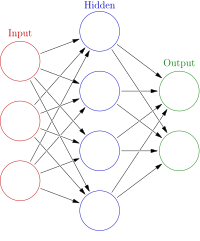
Photo from wikipedia
Since the start of the 21st century, few advances have had as far-reaching impact in science as the widespread adoption of artificial neural networks in fields as diverse as fundamental… Click to show full abstract
Since the start of the 21st century, few advances have had as far-reaching impact in science as the widespread adoption of artificial neural networks in fields as diverse as fundamental physics, clinical medicine, and psychology. In research methods, one promising area for the adoption of artificial neural networks involves the analysis of single-case experimental designs. Given that these types of networks are not generally part of training in the psychological sciences, the purpose of our article is to provide a step-by-step introduction to using artificial neural networks to analyze single-case designs. To this end, we trained a new model using data from a Monte Carlo simulation to analyze multiple baseline graphs and compared its outcomes with traditional methods of analysis. In addition to showing that artificial neural networks may produce less error than other methods, this tutorial provides information to facilitate the replication and extension of this line of work to other designs and datasets. (PsycInfo Database Record (c) 2022 APA, all rights reserved).
Journal Title: Psychological methods
Year Published: 2022
Link to full text (if available)
Share on Social Media: Sign Up to like & get
recommendations!